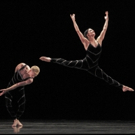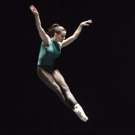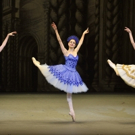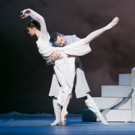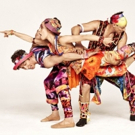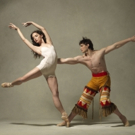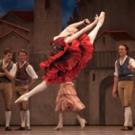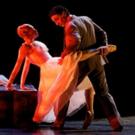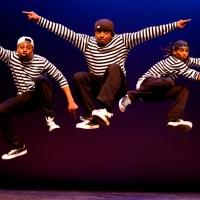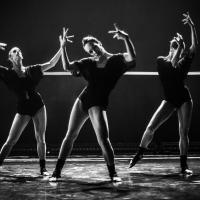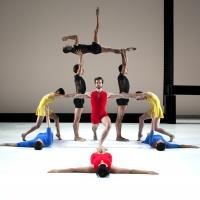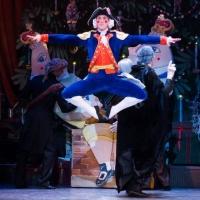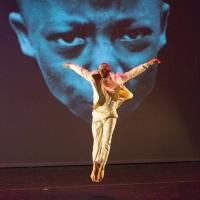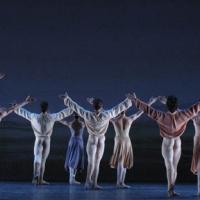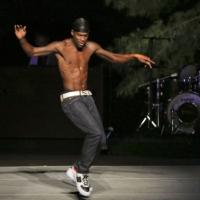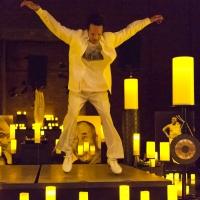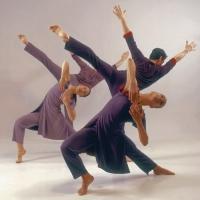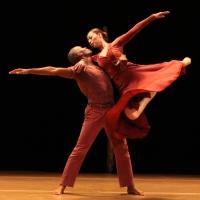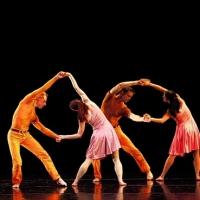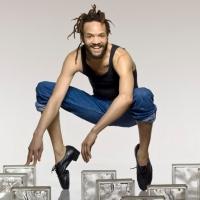Frances Steiner
 Frances Steiner is a lifelong dancer and is passionate about advancing dance and the performing arts. She graduated from Lawrence University with a BA in French and Government and is currently working as a fundraiser in the non-profit world. Now based in Washington DC, she is enjoying exploring its unique cultural environment. You can connect with Frances on twitter at @Frannysteiner.
Frances Steiner is a lifelong dancer and is passionate about advancing dance and the performing arts. She graduated from Lawrence University with a BA in French and Government and is currently working as a fundraiser in the non-profit world. Now based in Washington DC, she is enjoying exploring its unique cultural environment. You can connect with Frances on twitter at @Frannysteiner.
MOST POPULAR ARTICLES
May 31, 2016
Paul Taylor is a trailblazer of modern dance. As one of the most important living American artists, sending his company to perform at The Kennedy Center in the nation's capital is fitting-his choreography is dance Americana. Taylor's company offered two alternating programs. Program B, performed on Thursday night and Saturday afternoon, showed the strengths of his choreography's captivating lines, precise musicality, and overall wit.
February 29, 2016
On the evening of Thursday, February 25th 2016 at the Eisenhower Theater in Washington, DC, Director's Cut began with a standing ovation for Artistic Director Septime Webre who just announced his departure from the Washington Ballet after a seventeen-year tenure. Webre has transformed the Ballet from a sleepy little troupe into a respected regional company. Director's Cut shows off Webre's ambition and many of The Washington Ballet company's strengths. The evening featured three works by Webre, William Forsythe, and Annabelle Lopez Ochoa that were tied together by athleticism and physicality.
February 1, 2016
Having spawned a Disney movie, The Sleeping Beauty is likely the most well known of ballet's "big three." Almost every ballet company and ballet school has produced a version of this piece. American Ballet Theater was founded in 1939 to create a repertory of ballet's best historical works and to create new classics. In The Sleeping Beauty at The Kennedy Center, Alexei Ratmansky has brought one of the most canonical works in ballet back to its roots.
January 26, 2016
The themes of friendship, betrayal, romance, paranoia and regret run through Christopher Wheeldon's soon to be iconic The Winter's Tale. A joint commission by The Royal Ballet (premiered in 2014) and The National Ballet of Canada (premiered a few months ago), it sparkled during its American premiere at The Kennedy Center.
November 16, 2015
Twyla Tharp has been a major player in the dance world for fifty years, and is one of the most prolific, living American choreographers. While many know her from her work in Hair, Tharp's body of work is much larger. According to the program, Tharp has created over 160 works including "129 dances, 12 television specials, six Hollywood movies, four full-length ballets, four Broadway shows, and two figure skating routines." To celebrate the last fifty years, she is taking her company on tour to seventeen cities across the country. Wednesday night's performance (through Saturday) at the Kennedy Center was the tour's penultimate stop before a New York finale. Contrary to initial expectations, Tharp is not touring with her revamped greatest hits, but, instead, she has created new works to celebrate her moment. According to Tharp, these works depict the world. Preludes and Fugues shows the world as it should be, Yowzie as it is, and Fanfares is a little of both. Like a fanfare, the performance starts off loud with a blow of a horn and crescendos, building momentum until its final moment.
October 23, 2015
VelocityDC Dance Festival is true to its name. It showcases over 20 DC-based dance companies and individual artists over four days. Blink and you will miss it. This festival, started in 2009, is presented in partnership with Dance Metro DC, the DC Commission on the Arts and Humanities, Shakespeare Theatre Company, and Washington Performing Arts, and is aimed at showcasing the diversity and vitality of the DC dance scene. Each ticket to the performance is only $18, reducing the barrier to entry for a new dance patron. Friday's show featured 10 individual pieces and a site-specific dance before the main performance, plus a free dance class to finish off the night. Juggling 11 separate pieces in one evening, VelocityDC managed to drop a few balls.
June 15, 2015
Marius Petipa first staged Don Quixote for the Imperial Bolshoi Theater in 1869 to great acclaim, and it immediately entered the ballet canon. Almost every ballet enthusiast has seen a version of this work--new productions run the risk of seeming stale and mundane. This general familiarity made The Royal Ballet's decision to open its American tour with the U.S. premiere of Carlos Acosta's Don Quixote daring. The gambit paid off, however, as this production proved to be a fresh take on an old warhorse.
June 1, 2015
The Scottish Ballet performed A Streetcar Named Desire as a ballet at the Kennedy Center on Thursday, May 29th. On its face, this is a ridiculous statement. How could a foreign company perform the iconic American story by Tennessee Williams, much less translate it into pure movement? However, the production was extremely well conceived and magnificently executed in libretto, design, and dance.
April 29, 2015
In Lov: American Style, Rennie Harris, the prolific hip-hop choreographer, declares that hip-hop must maintain perpetual relevance. This work at DC's Dance Space, shows Harris' commitment to this tenet. Harris founded RHAW (Rennie Harris Awe-inspiring Works) in 2007 as a complement to his main company, Puremovement. He uses RHAW as a training company to help transition younger dancers into Puremovement. Harris mixes styles interchangeably (including Campbell Locking, Popping & Boogaloo, Bboy/girl, House. and Hip Hop) in order to vividly express pure emotion.
April 21, 2015
Gallim can be translated from Hebrew to mean "heaps." It is appropriate that a performance from Gallim Dance brings heaps of physical movements and heaps of creative thought. Gallim Dance is the brainchild Artistic Director and choreographer Andrea Miller. Miller's key innovation is remarkably imaginative movements with extreme physicality. Gallim Dance's DC premiere at The Landsburgh Theatre, co-produced by Washington Performing Arts and City Dance, thoroughly exemplified these ideas.
March 30, 2015
Although Jessica Lang Dance was founded in 2011, Artistic Director Jessica Lang is no newcomer to the dance scene. Lang, a disciple of Twyla Tharp, is on the faculty of American Ballet Theatre's Jacqueline Kennedy Onassis School and has been an active choreographer since 1999. Lang's signature style marries classical movements with a "striking design element." This theme played out through Jessica Lang Dance's performance at George Washington University's Lisner Auditorium, an evening co-presented with Washington Performing Arts and City Dance. The graphic component in particular was inconsistent throughout the evening and did not always further Lang's artistic vision.
March 23, 2015
The Joffrey Ballet recently made waves by announcing their commission of a brand-new, Chicago-inspired production of The Nutcracker. Choreographed by the buzzy Christopher Wheeldon, this new work will celebrate The Joffrey's hometown of Chicago by setting the story at the 1893 Chicago World's Fair. While many were excited by the prospect of a new work from this prominent choreographer, others questioned the move. The Joffrey already has a Nutcracker, so what isn't broken? A new homegrown Nutcracker allows The Joffrey to distinguish its production from the heap of other holiday entertainment options, gives a patron a new reason to return to a familiar story, and appeals to hometown pride.
November 13, 2014
BRIC House and Evidence are institutions that tell stories. BRIC tells Brooklyn's cultural story through exhibitions, performances, residencies, and community media programs. Evidence tells the story of the African diaspora through a unique mixture of contemporary movement, African dance, and the spoken word. It is no wonder that the two institutions are partnering together through a three-year residency for Ronald K. Brown, Evidence's artistic director (a Brooklyn resident) at BRIC.
November 5, 2014
American Ballet Theatre is widely recognized as one of the best ballet companies in the world. And much like the United States, ABT is a melting pot of diverse choreography and traditions. This year marks the company's 75th season, providing an ideal opportunity to showcase this varied repertory during their fall season at the David H. Koch Theater. Thursday's program of Twyla Tharp's Bach Partita, Alexei Ratmansky's Seven Sonatas, and Ji?i Kylian's Sinfonietta featured both contemporary and historically celebrated choreographers.
September 17, 2014
The Public Theater was founded on the idea that “Culture belongs to everyone.” While Fall for Dance Festival is a brainchild of New York City Center and not The Public, this mandate is similarly a founding principle of the festival. Each performance costs $15 and consists of four works from leading dance companies and artists. This year, City Center commissioned three works in addition to four American premieres and four New York City premieres. Last year, at the tenth anniversary of the festival, City Center partnered with The Public to present two free performances at the Delacorte Theater in Central Park. It was so successful that Fall for Dance at the Delacorte will become the annual kick off event. This year, the program consisted of works presented by Hubbard Street Dance Chicago, New York City Ballet, Bill T. Jones/Arnie Zane Dance Company, and Lil Buck.
July 7, 2014
Can a man tap dance his way to Nirvana? Many critics, dance patrons, and hoofers have described Savion Glover performances as a "spiritual experience." In Savion Glover's OM, currently in performance at The Joyce, he attempts to create the literal embodiment of that hyperbole.
May 6, 2014
What does a dance company do when its founder and visionary dies? While some leave with succession plans in place, this question still troubles many prominent dance companies. While they might chose to only perform their namesake's original works, they risk being labeled as irrelevant. If the company chooses to continue to perform new work, they must walk the tightrope of finding choreography that is congruent with the company's repertoire but also new and interesting.
April 22, 2014
Ballet Hispanico was founded in 1970 by Tina Ramirez in order to "explore, preserve, and celebrate Latino cultures through dance." Through its repertory of over 100 works, Ballet Hispanico attempts to represent the diversity of Latino culture. This range was fully evident during their Saturday matinee performance at the Joyce Theater.
March 20, 2014
Paul Taylor is the last of the living great modern choreographers of the 20th century. He began creating dances in 1954 and has worked with some of the biggest names of the dance world, including Martha Graham, Merce Cunningham, and George Balanchine; he has collaborated with some of today's most important visual artists such as Robert Rauschenberg, Ellsworth Kelly, and Jasper Johns. Many, if not all, choreographers cite him as an inspiration for their work. Paul Taylor's repertory should be permanently placed on a syllabus for any dance enthusiast. Saturday night's performance at Lincoln Center's David Koch Theatre showed the highs and the lows of Paul Taylor Dance Company.
November 4, 2013
Brooklyn Center for the Performing Arts at Brooklyn College started off its 2013-2014 season with the bang of Savion Glover's tap shoes. The venue hosted a performance of Savion Glover's STePz on November 2nd. In the program, Glover listed himself simply as "hoofer, father, husband." Nevertheless, it is undeniable that Glover is a living icon. Glover first appeared on Broadway at the age of 12 in The Tap Dance Kid. By his early 20s, Glover was nominated for a Tony Award for his choreography Bring in 'da Noise, Bring in 'da Funk. Many millenials grew up watching Glover as a featured performer on Sesame Street and today's children see him as the man behind the tap-dancing penguin in Happy Feet.
Videos


